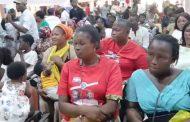 Minister for Gender, Children and Social Protection, Nana Oye Lithur, has called on the public to make regular visits to health facilities for checkups.
Minister for Gender, Children and Social Protection, Nana Oye Lithur, has called on the public to make regular visits to health facilities for checkups.
She gave the advice at a free health screening exercise organized by the Organization of Africa First Ladies against HIV and AIDS, “OAFLA” Ghana Chapter, in collaboration with the Ghana AIDS Commission.
The programme forms part of the First Lady’s prevention of Mother to Child transmission of HIV and keeping mothers alive advocacy campaign. The Minister, who is also a Commissioner of Ghana AIDs Commission, said in Ghana, HIV has a feminine face, since women and children form about 70 percent of all HIV cases.
She said in 2013 alone, 2407 children, ranging from newborns to 15 years, were infected with HIV saying besides HIV, there is also a huge gap in addressing the reproductive health needs of women.
More than 3,000 women are diagnosed with cervical cancer each year, yet, there are simple measures that help in reducing the incidence and severity of this disease conditions, she said.
“UNAIDS has set a long-term goal to end AIDs by 2030, and to achieve this goal, short-term targets have been set for countries to track their progress towards achieving the global long-term goal of ending the AIDS epidemic by 2030”.
Nana Oye Lithur said the short-term targets are popularly called “ 90-90-90 Fast Track Target “ meaning by 2020, 90 per cent of all people living with HIV will know their status; 905 of all people diagnosed with HIV infection will receive sustained anti-retroviral therapy; and 90 per cent of all receiving anti-retroviral therapy will have viral suppression.
The 90-90-90 target places emphasis on speed in scale-up and early initiation of HIV treatment in a manner consistent with human rights, that is why the Ghana AIDS Commission in conjunction with OAFLA Ghana Chapter, led by Dr. Nana Mrs. Lordina Mahama, embarked on the various campaigns, she added.
Nana Oye Lithur said there is the need for all to join hands with the first lady in her quest to address HIV and cancer concerns in the districts and communities.




